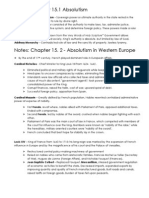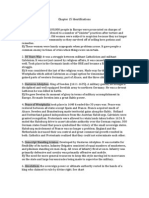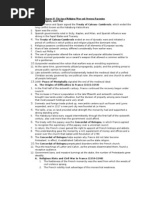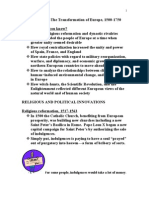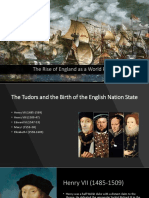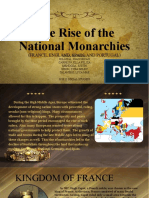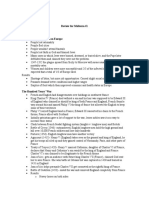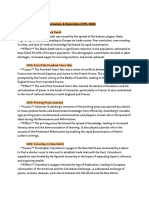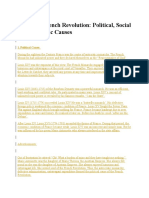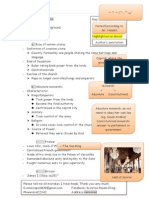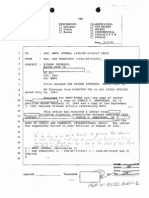0 ratings0% found this document useful (0 votes)
34 viewsThe Rise of Absolute Monarchs and National States
The Rise of Absolute Monarchs and National States
Uploaded by
เอกรัตน์ โสภณพาณิชThe document discusses the rise of absolute monarchs in Europe from the late Middle Ages through the 17th century. Key developments included kings gaining power at the expense of nobles, the introduction of gunpowder strengthening royal military power, and the theory of the divine right of kings justifying unlimited royal authority. The document specifically examines Cardinal Richelieu strengthening the French monarchy in the 1600s and King Louis XIV establishing himself as the absolute ruler of France through centralizing power and building the grand Palace of Versailles as his seat of power.
Copyright:
© All Rights Reserved
Available Formats
Download as PDF, TXT or read online from Scribd
The Rise of Absolute Monarchs and National States
The Rise of Absolute Monarchs and National States
Uploaded by
เอกรัตน์ โสภณพาณิช0 ratings0% found this document useful (0 votes)
34 views21 pagesThe document discusses the rise of absolute monarchs in Europe from the late Middle Ages through the 17th century. Key developments included kings gaining power at the expense of nobles, the introduction of gunpowder strengthening royal military power, and the theory of the divine right of kings justifying unlimited royal authority. The document specifically examines Cardinal Richelieu strengthening the French monarchy in the 1600s and King Louis XIV establishing himself as the absolute ruler of France through centralizing power and building the grand Palace of Versailles as his seat of power.
Original Title
The_Rise_of_Absolute_Monarchs_and_National_States
Copyright
© © All Rights Reserved
Available Formats
PDF, TXT or read online from Scribd
Share this document
Did you find this document useful?
Is this content inappropriate?
The document discusses the rise of absolute monarchs in Europe from the late Middle Ages through the 17th century. Key developments included kings gaining power at the expense of nobles, the introduction of gunpowder strengthening royal military power, and the theory of the divine right of kings justifying unlimited royal authority. The document specifically examines Cardinal Richelieu strengthening the French monarchy in the 1600s and King Louis XIV establishing himself as the absolute ruler of France through centralizing power and building the grand Palace of Versailles as his seat of power.
Copyright:
© All Rights Reserved
Available Formats
Download as PDF, TXT or read online from Scribd
Download as pdf or txt
0 ratings0% found this document useful (0 votes)
34 views21 pagesThe Rise of Absolute Monarchs and National States
The Rise of Absolute Monarchs and National States
Uploaded by
เอกรัตน์ โสภณพาณิชThe document discusses the rise of absolute monarchs in Europe from the late Middle Ages through the 17th century. Key developments included kings gaining power at the expense of nobles, the introduction of gunpowder strengthening royal military power, and the theory of the divine right of kings justifying unlimited royal authority. The document specifically examines Cardinal Richelieu strengthening the French monarchy in the 1600s and King Louis XIV establishing himself as the absolute ruler of France through centralizing power and building the grand Palace of Versailles as his seat of power.
Copyright:
© All Rights Reserved
Available Formats
Download as PDF, TXT or read online from Scribd
Download as pdf or txt
You are on page 1of 21
The Rise of Absolute Monarchs
and National States
Rise of the Absolute Monarch
1. From Weak Medieval King to Absolute
Monarch.
Near the end of the Middle Ages, the King –
particularly in England, France, Spain, Russia,
and Austria – began to extend his rule at the
expense of the nobles. By the 17th century, the
king had become an autocrat, or absolute
monarch. His supremacy was acknowledged by
commoners and lords.
Exceptions to National Unity: Germany
and Italy
Rise of the Absolute Monarchs
Factors Strengthening Royal Power.
a. The Crusades and other wars killed many feudal lords.
b. The rising middle class supported the monarch to
assure protection of property and trade.
c. The introduction of gunpowder equipped the
monarch with a powerful weapon that could destroy
castles of feudal lords.
d. The Reformation provided the monarch with some
powers formerly held by the Catholic Church.
e. The awakening spirit of nationalism made the
monarch the symbol of national unity.
Divine Right of Kings
This theory attempted to justify unlimited royal
power with these arguments:
a. The king ruled by God’s authority as God’s
earthly representative;
b. Obedience to the king was obedience to God.
c. A mutually supportive and reinforcing
relationship between monarch and Church;
Developments in France
Background:
Hundred Years War
Religious Civil wars
__________________________
Cardinal Richelieu Guides France (1624-1642)
A cardinal of the Church and minister to King Louis
XIII, skillfully directed French affairs to attain
supremacy for the king and world power for France.
Cardinal Richelieu
• Supremacy for the King Louis XIII. Richelieu
1. Destroyed the nobles’ fortified castles,
2. Transferred local government functions from the
noble to royal officials, the intendants,
3. Levied taxes without consent of the French
lawmaking body, the Estates General.
• World Power for France
Richelieu led France into the 30 Years’ War in support of
the Protestant cause(even though France is officially
Catholic) France defeated its Catholic Hapsburg rivals in
Austria.
Louis XIV: The Grand Monarch
a. The Absolute Monarch.
Louis XIV represented the height of absolutism.
Proclaiming that he ruled by Divine Right, Louis
considered himself the Sun King.
Near Paris he built the magnificent Palace of Versailles,
where he maintained an extravagant court. At Versailles,
the nobility fawningly waited upon him and courted his
favor. (Keep your friends close and your enemies closer.)
Louis exercised unlimited political powers. Not once
during his long reign did he convene the Estates-General.
To illustrate his attitude, tradition ascribes to Louis the
statement, “L’etat, c’est moi,” meaning “I am the state.”
Louis XIV The Sun King
• L
Palace of Versailles
Versailles
Versailles
Versailles
Versailles
Roslyn Connection
Louis XIV
b. Economic Affairs:
Louis entrusted economic matters to his able finance minister,
Jean Baptiste Colbert. To further prosperity, Colbert
promoted good farming methods, built roads and canals,
protected industries with tariffs, aided new industries with
subsidies, and helped establish French trading posts in India
and colonies in North America. Key to prosperity.
In 1685, to compel Catholic religious uniformity, Louis
revoked the Edict of Nantes. This action damaged the
economy because thousands of Protestant Huguenots (mostly
skilled workers and enterprising business people) fled France.
Many settled in England, Holland and America.
French Court a Center of Culture
• Concerts
• Theater performances
• Dances
• Plays – Moliere
_______________________________
This attention to the arts at court was imitated
by the nobility and later the rising middle class.
Louis XIV as Patron
Foreign Affairs
Louis pursued an ambitious, aggressive foreign
policy. He sought for France its “natural
boundaries,” especially the Rhine River. Fighting
three major wars, he acquired some territory
but failed to achieve the Rhine boundary. In a
fourth major war, Louis lost some overseas
possessions but place a Bourbon relative on the
Spanish throne.
Wars of Louis XIV
Legacy
At Louis XIV’s death France was the leading
nation on the European continent. But the
French people had wearies of wars, taxes,
famine and despotism. France was exhausted
and bankrupt.
Louis XVI, a descendant of the Grand Monarch,
was to experience the people’s extreme reaction
in the 1789 French Revolution.
You might also like
- APEC Chapter 15 NotesDocument12 pagesAPEC Chapter 15 NotesSteven ChenNo ratings yet
- Maamor Vayita Eishel - Vayeiroh 5747Document32 pagesMaamor Vayita Eishel - Vayeiroh 5747leahNo ratings yet
- Chapter 16 Outline AP EuroDocument2 pagesChapter 16 Outline AP EuroAndrew TreulichNo ratings yet
- Chapter 15 ID'sDocument8 pagesChapter 15 ID'sMax KalickNo ratings yet
- Age of AbsolutismVG PPT - ADocument86 pagesAge of AbsolutismVG PPT - ALucky HamachinoNo ratings yet
- Absolute Monarchs in EuropeDocument40 pagesAbsolute Monarchs in Europechristellistel100% (1)
- Review Questions Pg. 118Document2 pagesReview Questions Pg. 118Eamon BarkhordarianNo ratings yet
- 21-2 The Reign of Louis Xiv 2Document17 pages21-2 The Reign of Louis Xiv 2api-213462480No ratings yet
- Absolutism and Constitutionalism in Western Europe - France and EnglandDocument6 pagesAbsolutism and Constitutionalism in Western Europe - France and EnglandmsG77100% (1)
- Vlad Torishnyak Date October 14 Period 1 Ap EuroDocument4 pagesVlad Torishnyak Date October 14 Period 1 Ap EuroVlad TorishnyakNo ratings yet
- Age of Absolutism - Louis XIVDocument13 pagesAge of Absolutism - Louis XIVMaya KhaledNo ratings yet
- European Absolutism Notes HISTORYDocument17 pagesEuropean Absolutism Notes HISTORYMirel BaysalNo ratings yet
- The Sun KingDocument20 pagesThe Sun KingMaya KhaledNo ratings yet
- AP Euro Chapter 15Document8 pagesAP Euro Chapter 15Giulia ConleyNo ratings yet
- Sec2 SummaryDocument1 pageSec2 Summaryapi-263290130No ratings yet
- Absolutism Review SheetDocument6 pagesAbsolutism Review SheetPB and JalapenosNo ratings yet
- SS Worksheet 2 Medieval CivilizationDocument8 pagesSS Worksheet 2 Medieval CivilizationPenny BesidNo ratings yet
- The Medieval University:: Scholasticism & Urban Intellectual LifeDocument61 pagesThe Medieval University:: Scholasticism & Urban Intellectual LifeyangliNo ratings yet
- SSII Chapter 19 Medieval EuropeDocument72 pagesSSII Chapter 19 Medieval Europedowon.weiNo ratings yet
- The Three Orders ch6 NoteDocument4 pagesThe Three Orders ch6 Notelitchislove5815No ratings yet
- CH 13 Absolutism and ConstitutionalismDocument20 pagesCH 13 Absolutism and ConstitutionalismSam Caballero KirchnerNo ratings yet
- Chapter 15 Notes AP EuroDocument11 pagesChapter 15 Notes AP Eurodrea4152100% (2)
- New Monarchs, Exploration & 16 Century Society: Use Space Below For NotesDocument18 pagesNew Monarchs, Exploration & 16 Century Society: Use Space Below For Notesfres7451No ratings yet
- Chapter 15 NotesDocument8 pagesChapter 15 NotesVuongmusic100% (2)
- 2 Absolute Monarchy in France2Document31 pages2 Absolute Monarchy in France2rutendogavi9No ratings yet
- AP Euro Ch. 15 NotesDocument2 pagesAP Euro Ch. 15 NotesJSun YiNo ratings yet
- Za Kolokvijum Iz Britanske IstorijeDocument4 pagesZa Kolokvijum Iz Britanske Istorijelingvista 106No ratings yet
- Thirty Years War, Louis XIII, and Cardinal RichelieuDocument5 pagesThirty Years War, Louis XIII, and Cardinal RichelieunathaliecarrawayNo ratings yet
- Or Some People, Indulgences Would Take A Lot of MoneyDocument17 pagesOr Some People, Indulgences Would Take A Lot of MoneyChristina NguyenNo ratings yet
- (SLIDE 1) : Additional Info!!!!Document2 pages(SLIDE 1) : Additional Info!!!!Dexy DexNo ratings yet
- Chapter 6Document5 pagesChapter 6Brahma Dutta DwivediNo ratings yet
- CHAPTER 14 - Crisis and Absolutism in EuropeDocument25 pagesCHAPTER 14 - Crisis and Absolutism in EuropeJonathan Daniel KeckNo ratings yet
- 3 Orders NotesDocument5 pages3 Orders Notesrwaliur780% (1)
- CHPT 1 OutlineDocument18 pagesCHPT 1 Outlineapi-324512227No ratings yet
- 11051 France outlineDocument2 pages11051 France outlinestevensrobe1No ratings yet
- Rancia From The Weakened Merovingians and Founded TheDocument6 pagesRancia From The Weakened Merovingians and Founded TheGrayNo ratings yet
- Ancien RegimeDocument23 pagesAncien RegimeCarlos Camilo Sanchez ValdelomarNo ratings yet
- CH 9 Emerging Europe ByzantineDocument21 pagesCH 9 Emerging Europe Byzantineapi-268644570No ratings yet
- France and Absolute MonarchyDocument5 pagesFrance and Absolute MonarchyBarbara WoodNo ratings yet
- CHAPTER 4 Notetaking and Study Guide AnswersDocument5 pagesCHAPTER 4 Notetaking and Study Guide AnswersEric Xiao0% (1)
- Chapter 18: Absolutism and Limited Power in The Age of Capitalism: 1648 - 1774 (Page 480)Document9 pagesChapter 18: Absolutism and Limited Power in The Age of Capitalism: 1648 - 1774 (Page 480)sukikunNo ratings yet
- AP Euro Study Guide Chapter 12Document4 pagesAP Euro Study Guide Chapter 123l39h4ntNo ratings yet
- The Rise of England As A World PowerDocument12 pagesThe Rise of England As A World PowerCarlota DcpNo ratings yet
- Group 4 - The Rise of The National MonarchiesDocument27 pagesGroup 4 - The Rise of The National MonarchiesZyra Milky Araucto SisonNo ratings yet
- European History LecturesDocument41 pagesEuropean History LecturesWarisha RanaNo ratings yet
- Review For Midterm 1 2010Document18 pagesReview For Midterm 1 2010Layla PajtNo ratings yet
- Timeline FOR AP EUROPEAN HISTORYDocument12 pagesTimeline FOR AP EUROPEAN HISTORYAanya PatelNo ratings yet
- додаткові завданняDocument3 pagesдодаткові завданняАнастасияNo ratings yet
- Weekly Reading 417-421pgDocument2 pagesWeekly Reading 417-421pgalexanderanyah550No ratings yet
- The Age Of: Absolute MonarchsDocument48 pagesThe Age Of: Absolute MonarchsIshaan KhandelwalNo ratings yet
- GH2 Final (Part 1)Document12 pagesGH2 Final (Part 1)karol_stuyNo ratings yet
- Politics and ReformationDocument11 pagesPolitics and ReformationMiguel AlessandroNo ratings yet
- Historia Tema 7Document7 pagesHistoria Tema 7cbermudezgallinadNo ratings yet
- AP Euro Unit 2 Study GuideDocument11 pagesAP Euro Unit 2 Study GuideexmordisNo ratings yet
- 11 French RevolutionDocument25 pages11 French RevolutionJihee YoonNo ratings yet
- Causes of French RevolutionDocument4 pagesCauses of French RevolutionShabnam BarshaNo ratings yet
- 12 - Wars of Religion Economy and State BuildingDocument6 pages12 - Wars of Religion Economy and State Buildingapi-419817757No ratings yet
- Age of RevolutionDocument11 pagesAge of Revolutiondobojac73No ratings yet
- CCEH #13 Absolute MonarchyDocument3 pagesCCEH #13 Absolute Monarchyalvinvarghese8aNo ratings yet
- Absoute Monarchs 2Document33 pagesAbsoute Monarchs 2Joshua OrtizNo ratings yet
- The Great Events by Famous Historians, Volume 12From EverandThe Great Events by Famous Historians, Volume 12No ratings yet
- CSD-Tesla-BMS-0000051 Rev 6 Supplier Handbook July 14,2016Document48 pagesCSD-Tesla-BMS-0000051 Rev 6 Supplier Handbook July 14,2016Kevin Huynh100% (1)
- BC OBE SYLLABUS Template Court TestimonyDocument6 pagesBC OBE SYLLABUS Template Court TestimonyJay Emmanuel100% (1)
- AP-5907 CashDocument12 pagesAP-5907 CashxxxxxxxxxNo ratings yet
- Republic Act No. 10066Document15 pagesRepublic Act No. 10066John Steven FoscabloNo ratings yet
- Debt RestructuringDocument4 pagesDebt RestructuringPushTheStart GamingNo ratings yet
- Blackbeard Living Rules Summary v2Document5 pagesBlackbeard Living Rules Summary v2sulaco1260No ratings yet
- Financial Statement FraudDocument23 pagesFinancial Statement Fraudwawan_pras100% (2)
- DataminerDocument171 pagesDataminerVishnuNadarNo ratings yet
- GR No 116801Document11 pagesGR No 116801Abs AcoonNo ratings yet
- 19910903a FBI Memo Maxpharma Solodoff CocaineDocument3 pages19910903a FBI Memo Maxpharma Solodoff CocaineSamples Ames PLLCNo ratings yet
- Aii Dee 12982 23-11-2011 Dalvi Samina (Ashraf Qazi Ancl Mumbra) p2Document2 pagesAii Dee 12982 23-11-2011 Dalvi Samina (Ashraf Qazi Ancl Mumbra) p2zaheerbcNo ratings yet
- 4 SalariesDocument6 pages4 SalariesSrinishaNo ratings yet
- Introduction To Politics: Lectures Session 3 Political Ideas and IdeologiesDocument46 pagesIntroduction To Politics: Lectures Session 3 Political Ideas and IdeologiesABDOULIENo ratings yet
- Invitation For Tenders (IFT) (International)Document3 pagesInvitation For Tenders (IFT) (International)Tamanna ChakmaNo ratings yet
- Questions: Sony EricssonDocument4 pagesQuestions: Sony EricssonshalalalaNo ratings yet
- Anti Terrorism Act of 2020 (Position Paper)Document4 pagesAnti Terrorism Act of 2020 (Position Paper)Francine SenapiloNo ratings yet
- Financial AuditingDocument4 pagesFinancial AuditingĐoàn Thanh TâmNo ratings yet
- Quiz - Chapter 1 - Partnership Formation - 2021 EditionDocument5 pagesQuiz - Chapter 1 - Partnership Formation - 2021 EditionYam SondayNo ratings yet
- A-Z Economic Terms (Part1)Document27 pagesA-Z Economic Terms (Part1)Srinivasan .MNo ratings yet
- Antonio Vs Reyes Case Digest de LeonDocument1 pageAntonio Vs Reyes Case Digest de Leongherold benitezNo ratings yet
- Dti RequirementsDocument2 pagesDti RequirementsTin VillarosaNo ratings yet
- 1A2 RBI Monetary Policy PCB11Document64 pages1A2 RBI Monetary Policy PCB11Ronith RNo ratings yet
- QUESTION BANK ITLP SK NOV 2022 BBA 6 Nov 2022 FINAL UNIT1&2Document5 pagesQUESTION BANK ITLP SK NOV 2022 BBA 6 Nov 2022 FINAL UNIT1&2Hemant WadhwaniNo ratings yet
- Leadership Lesssons From The Movie - The Last CastleDocument12 pagesLeadership Lesssons From The Movie - The Last CastlescarceboyzNo ratings yet
- Division of Safety Regulation Revision: 0: Tanzania Civil Aviation AuthorityDocument13 pagesDivision of Safety Regulation Revision: 0: Tanzania Civil Aviation AuthorityMik AeilNo ratings yet
- BLOCK D ReviewerDocument235 pagesBLOCK D Revieweradek_shoppeNo ratings yet
- Legal Aspect of Event ManagementDocument18 pagesLegal Aspect of Event Managementanuj sonewaneNo ratings yet
- Registration Form (Org)Document2 pagesRegistration Form (Org)Ika BasriNo ratings yet
- Final 20041Document11 pagesFinal 20041bhargavasharma c sNo ratings yet
